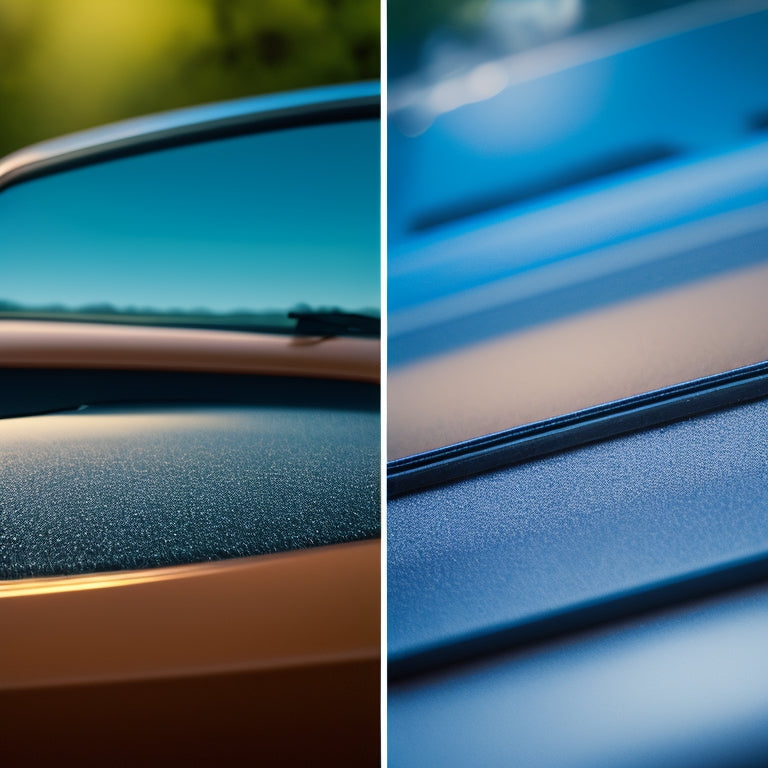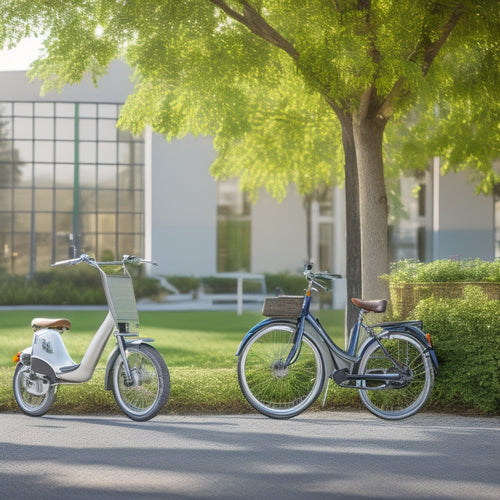
What's the Best Way to Clean Car Solar Panels?
Share
To clean your car's solar panels, start by choosing the right tools, like a soft-bristled brush or microfiber cloth, to avoid scratching the surface. Inspect the panels, removing any loose debris, and consider the panel type and manufacturer's guidelines before cleaning. For a deeper clean, mix a mild soap solution with distilled water, and gently wipe the panels in a circular motion. Rinse frequently to prevent dirt redistribution, and dry the panels thoroughly to prevent water spots. By following these steps, you'll be well on your way to maintaining your solar panels in top condition - and there's more to explore to ensure peak performance.
Key Takeaways
• Use a soft-bristled brush or microfiber cloth to clean car solar panels to avoid scratching the surface.
• Remove loose debris regularly to maintain efficiency, and gently sweep with a soft-bristled brush or dedicated cleaning brush.
• Mix a mild soap solution with distilled water, and gently wipe panels in a circular motion from top to bottom, rinsing the cloth frequently.
• Dry the panels using a microfiber cloth or squeegee to remove excess moisture and prevent water spots.
• Consider cleaning car solar panels in the shade or on a cloudy day to avoid water spots, and inspect panels for debris, dust, or dirt accumulation.
Choosing the Right Cleaning Tools
When cleaning your car's solar panels, you'll need a soft-bristled brush or a microfiber cloth to gently sweep away debris and dirt, ensuring a scratch-free clean. The right cleaning tools are essential to maintaining your solar panels' efficiency.
A soft-bristled brush with nylon or polyester bristles is an excellent option, as it effectively removes dirt and debris without scratching the panel's surface.
Microfiber cloths are another excellent choice, as they're gentle and effective at removing dirt and grime. Look for cloths with a high thread count and a soft, dense weave to ensure a scratch-free clean.
Avoid using brushes with metal or hard bristles, as they can scratch or damage your solar panels. Similarly, avoid using paper towels or other abrasive materials that can cause damage.
When selecting a brush or microfiber cloth, consider the material's quality and durability. A high-quality brush or cloth will last longer and provide a better clean.
Preparing Your Solar Panels
Before you start cleaning your car's solar panels, take a few minutes to prepare the surface by inspecting for any loose debris and removing any large objects that could interfere with the cleaning process. This step is important to guarantee a smooth and effective cleaning process.
Next, take note of your panel orientation and placement. Are your solar panels installed at an angle or are they flat? Are they positioned in a way that allows for easy access or are they tucked away in a hard-to-reach spot? Understanding the layout of your solar panels will help you determine the best approach for cleaning.
Consider the type of solar panels you have and their specific cleaning requirements. Some panels may have specific cleaning instructions, so it's crucial to review the manufacturer's guidelines before proceeding.
Removing Loose Debris and Dirt
How much loose debris and dirt are you leaving behind on your solar panels, reducing their energy output and overall performance? Regularly removing loose debris and dirt is essential to maintain your solar panels' efficiency.
Start by gently sweeping away any loose leaves, twigs, or other debris using a soft-bristled brush or a dedicated solar panel cleaning brush. Be gentle, as you don't want to scratch the panels.
For more stubborn dirt, use a microfiber cloth to wipe down the panels. This is especially important for older panels, as their efficiency decreases over time due to natural degradation.
Additionally, wind resistance can also contribute to dirt accumulation, so it's important to clean your panels regularly.
Using Water and Soap Solution
Mix a mild soap solution with distilled water in a bucket, and dip a soft, lint-free cloth or sponge into it, wringing it out thoroughly to prevent any drips or runs on your solar panels. This solution will help remove dirt and grime without leaving streaks or residue. Be cautious not to use harsh chemicals or abrasive materials that can damage the panels.
| Soap Type | Effectiveness | Risk of Soap Residue |
|---|---|---|
| Mild dish soap | High | Low |
| Car wash soap | Medium | Medium |
| Harsh chemicals | Low | High |
When cleaning, gently wipe the solar panels in a circular motion, working from top to bottom. Avoid applying too much pressure, which can scratch the panels. Rinse the cloth or sponge frequently to prevent dirt and debris from being redeposited onto the panels.
Remember to avoid cleaning your solar panels in direct sunlight, as this can cause water spots to form. Instead, clean them in the shade or on a cloudy day. By following these steps, you'll be able to effectively clean your car's solar panels without leaving behind soap residue or water spots.
Drying and Inspecting Panels
Now that you've cleaned your car's solar panels, it's crucial to dry and inspect them properly.
You'll need to eliminate excess moisture to prevent water spots and guarantee efficient energy harvesting.
Next, you'll examine the panels for any remaining debris and assess their efficiency to make sure they're operating at their peak.
Removing Excess Moisture
After cleaning, you'll need to dry your car's solar panels to prevent water spots and guarantee maximum energy harvesting. Removing excess moisture is essential, especially in high-humidity environments where dew formation can occur. You don't want dew or water spots to reduce your solar panels' energy output.
To control humidity, use a microfiber cloth or a squeegee to remove excess water from the panels. This will also help prevent mineral deposits from forming, which can further decrease energy efficiency.
When drying your solar panels, make sure to wipe them in a circular motion, starting from the top and working your way down. This helps prevent water from dripping down the panel and reduces the risk of water spots.
Additionally, consider using a drying agent or a water-repellent coating to further minimize water spots and facilitate easier cleaning. By taking these steps, you'll ensure your solar panels remain clean, dry, and efficient, providing you with the maximum energy output possible.
Inspecting for Debris
With your solar panels dry, you can proceed to inspect them for debris, dust, or dirt that may have accumulated during the cleaning process. This step is important in guaranteeing peak energy harvesting. Debris accumulation can lead to visual obstructions, reducing the panel's efficiency. Take a closer look at the panels, paying attention to the surface, corners, and edges.
Here's a checklist to help you identify potential issues:
| Area to Inspect | Common Debris Found |
|---|---|
| Panel Surface | Dust, dirt, leaves |
| Corners | Twigs, small branches |
| Edges | Dirt, sand, small rocks |
| Frame and Mounts | Spider webs, insect nests |
| Connectors and Cables | Dirt, corrosion |
As you inspect, gently remove any debris you find. Avoid using harsh chemicals or abrasive materials that could scratch the panels. If you notice stubborn stains or grime buildup, consider using a mild soap solution and a soft-bristled brush. By thoroughly inspecting and cleaning your solar panels, you'll ensure maximum energy production and prolong their lifespan.
Checking Panel Efficiency
You can assess the solar panel's efficiency by measuring its voltage and current output, which will indicate if the cleaning process has restored its energy-harvesting capabilities. This step is important in determining if your cleaning efforts have paid off.
By conducting an energy audit, you'll gain valuable insights into your panel's performance metrics, such as its energy output, voltage, and current.
Compare these metrics to the manufacturer's specifications or your panel's initial performance data to gauge the effectiveness of the cleaning process. If the numbers align, you can be confident that your panel is functioning efficiently.
However, if the metrics reveal a discrepancy, it may indicate that further cleaning or maintenance is required.
Scheduling Regular Maintenance
Regular maintenance scheduling is crucial to guarantee your car's solar panels operate at peak efficiency and extend their lifespan. By staying on top of maintenance, you'll avoid performance issues and costly repairs down the line. To make it easy, consider implementing a seasonal scheduling approach. This way, you'll make sure your solar panels receive the attention they need at the right time.
Here are some maintenance reminders to add to your calendar:
-
Spring:
Inspect panels for winter debris and clean off any dirt or grime that's accumulated. -
Summer:
Check panel temperatures to ensure they're within the ideal range for maximum energy production. -
Fall:
Perform a thorough cleaning to remove leaves and other seasonal debris.
-
Winter:
Inspect panels for snow and ice buildup, and consider using a snow rake or soft brush to gently remove any accumulation.
Frequently Asked Questions
Can I Use a Pressure Washer to Clean My Solar Panels?
'Don't use a pressure washer to clean your solar panels, as it can cause water damage. Instead, take safety precautions and opt for a soft-bristled brush, mild soap, and distilled water to guarantee a safe and effective cleaning process.'
How Often Should I Clean My Solar Panels During Winter?
'Brave knight, during winter, you'll want to clean your solar panels every 2-4 weeks to maintain peak energy output, focusing on snow removal and winter maintenance to keep the panels shining like King Arthur's Excalibur.'
Will Cleaning My Solar Panels Increase Their Efficiency?
You'll boost energy output by cleaning your solar panels, as dust accumulation reduces their efficiency. By removing debris, you'll maximize energy production, and with regular cleaning, you'll maintain peak performance.
Can I Clean My Solar Panels at Night or in the Shade?
You might think it's okay to clean your solar panels at night or in the shade, but don't risk damaging them; instead, opt for daytime cleaning when the sun's reflection isn't a concern, ensuring Shade Safety and avoiding Nighttime Reflection issues.
Are There Any Eco-Friendly Cleaning Products for Solar Panels?
You're looking for eco-friendly alternatives to clean your solar panels, right? Opt for products with green certifications like EcoLogo or Safer Choice, which guarantee a reduced environmental impact without compromising cleaning efficiency.
Related Posts
-

What Makes Eco-Friendly Car Batteries a Smart Choice?
You're considering eco-friendly car batteries, and for good reason. They offer a trifecta of benefits that make them ...
-

What Are the Best Eco-Friendly Rides for Campus?
As you navigate your college campus, you have a wide range of eco-friendly ride options to choose from, including bic...
-

Why Go Solo in Urban Transportation?
You're taking control of your daily commute by ditching the crowds and going solo, and that's a smart move. By choosi...


